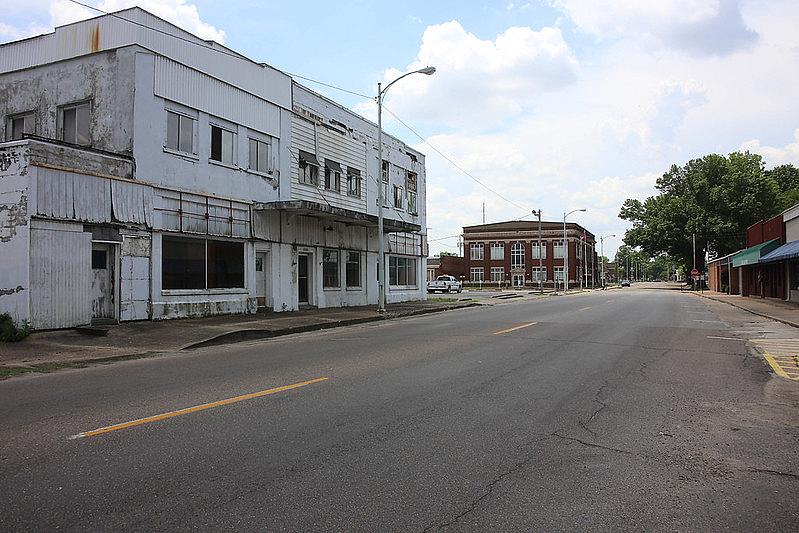In the Delta region of Arkansas, poverty and limited health care compound inequities

Downtown Blytheville in Arkansas’ Delta region.
(Photo by Paul Sableman via Flickr/Creative Commons)
Years before I started working on a reporting project on the Delta region of Arkansas, I worked in Pine Bluff and Blytheville and I remember seeing the abandoned buildings, the forgotten neighborhoods and the empty stores and saying to myself, “I wonder what happened to these places.” Even now after uncovering the past of the Delta, it can be hard to believe the sequence of events that made it to the place it is today.
Our “Crown Jewels” project was sparked by this interest in how a region can go from the economic center of the state to a declining region in the span of a few decades, and how this can play into the clear health disparities in the state. We came across multiple data sets that very clearly showed that once investment in these cities disappeared, so did the people, the jobs, and sometimes the hope.
For years, statistics have shown that a person born in the Delta of Arkansas has a lower life expectancy than someone born in the urban areas of Central and Northwest Arkansas or even other rural areas. The COVID-19 pandemic brought renewed attention to these differences, which are connected to, among other things, access to health care and poverty.
The numbers showed that once a major job provider left a city, it caused a ripple effect across the region when it came to health equity.
Our question was a basic one: What happened and why hasn’t it been fixed?
The answers to these questions created a three-part story series that had multiple sidebars, graphics, and maps, and even then we weren’t able to tell everything the data showed us.
We got answers from hospitals, clinics, politicians and business leaders, but the story wasn’t as straightforward as we thought. The project was mainly supposed to be about the Delta cities of Pine Bluff and Blytheville, but when the data started coming along, we knew the issue was much bigger than two cities.
It took less than two days after I posted my interest in covering health inequities in the Delta before my inbox was filled with people suggesting who I should talk to about this issue. This was my first hint at what became a theme throughout the project: the complete self-awareness of Delta residents about their situation and their desperation for these things to change.
My reporting, which looked at the people behind the numbers, was inspired mostly by two studies: the University of Arkansas Cooperative Extension Service’s 2021 Rural Profile and the state’s Red County report.
The Rural 2021 Profile stated the rural areas of the state ranked low on key health factors and outcomes compared with their urban counterparts. On health outcomes, counties in urban areas had better scores, while those in the Delta and Coastal Plains had the worst scores. Eight of 11 counties with the worst health outcomes were in the Delta.
Since this work was based on a top-down view of the Delta, I wanted to find out whether the situation was viewed the same by the people who lived there.
Usually this is an area where a story like this can get derailed because residents are usually willing to talk, but the government and business leaders in the area want to avoid negative perceptions. Surprisingly, this time most county and city leaders were willing to speak about the issues very clearly.
I partly credit the willingness to speak to the timing of the release of census data that clearly showed the mass migration of people out of the Delta region. This series was the first opportunity for most of them to speak about the situation that was happening since the data was released.
We faced some adversity with the COVID-19 pandemic, a personal injury I suffered that limited my mobility, and several businesses refused to speak about the issue, but we were able to collect stories despite these challenges. The response I got from a lot of Delta and rural residents when the stories were published was thankfulness. They’ve faced some of these issues for years.
There’s a lack of medical specialists in the Delta region and many people face transportation challenges. The closure of businesses can affect a community beyond job losses and economic impacts. Mental health problems are exacerbated by the lack of facilities to treat these issues in rural regions. The lack of investment in the region’s cities leads to frustration as residents watch businesses thrive in other areas of the state.
We were able to link these stories like chapters to the research data that we discovered and created a narrative timeline of how a region can decline. But we also detailed the hope that permeates these areas and the collective ability to change these situations.
I plan to continue to cover issues in the Delta, but from the state capitol and it will be curious to see if any of these stories are used in the future to shift investment into the region.
Some advice for reporters who are covering health inequities such as those affecting the Delta:
-
Doing stories in rural areas takes time. Not all organizations have communications staff or a spokesperson. Patience is the key.
-
Give readers a reason to relate. Data is great way to get your point across, but adding personal stories makes it seem more real to people.
-
End things with hope. Bad news can be balanced out with giving a point of perspective that shows an effort to fix it. Continuous bad will cause some people to tune out.
